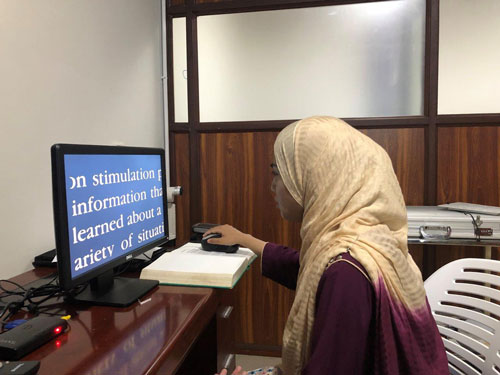Approximately 3.2 million people in Pakistan are living with functional low vision, a visual impairment that can't be corrected with regular glasses. Low vision services, training in use of assistive devices and counselling are key to facilitating social inclusion for people with low vision. Women account for 49% of the total people with low vision in Pakistan.
The Global Gender Gap Report 2017 places Pakistan as world's second lowliest where 'women and girls face inequality while accessing opportunities and services related to health and education due to gender stereotypes and other socio-political barriers.' The situation further aggravates for women and girls with low vision.
Low vision services provided by the Brien Holden Vision Institute promote inclusion of people with low vision, especially young women, to live a productive social, economic and recreational life.
Amna, 22, was forced to discontinue her education and friendships due to curtailed mobility and compromised vision. She started using glasses when she was in third grade. During 10th grade, she realised that her eyesight was further deteriorating and she was not able to read the books, see the blackboard and differentiate the colours. She lost confidence when she faced blurriness during mobility and difficulty in recognising road signs. She needed someone from her family to accompany her to school and on any social activities.
"I visited too many clinics and doctors. I could not find a good low vision clinic in my nearby towns. It seems this resulted in wastage of four prime years in my life. I stopped my education and social activities and went in isolation," said Amna.
A friend of Amna suggested she visit the low vision clinic at Brien Holden Vision Optical, in Rawalpindi district. Amna was examined by a qualified optometrist and received a comprehensive low vision assessment. She was prescribed low vision devices and trained to use them effectively. She also attended multiple counselling sessions. Amna returned home and started using her devices and her visual efficiency improved significantly. She regained her confidence to start her independent commute to school and to meet with her friends.
"My confidence has become enhanced. I have resumed my studies and started visiting my friends again, an ability for which I am very grateful. I feel myself back in life with more control and empowerment," added Amna.
Amna plans to pursue her studies up to doctorate level now she can use assistive devices to study. She is happy to be an active member of her family again and becoming a source of motivation for other young girls in her neighbourhood. A positive sense of inclusion has also contributed to Amna's improved mental health, motivation, and good academic outcomes.
Brien Holden Vision Institute is supported by the Australian Government through the Australian NGO Cooperation Program (ANCP).

